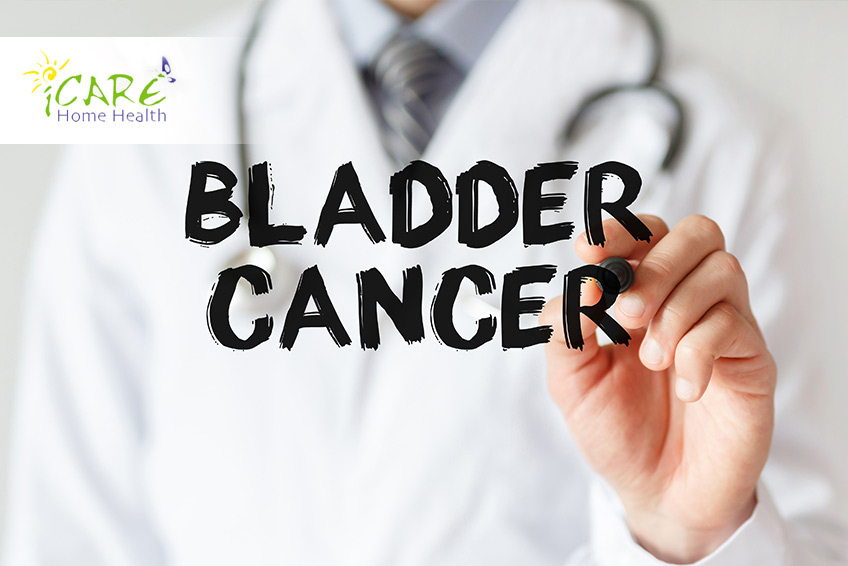Bladder Cancer Awareness: What You Need To Know

Bladder cancer is a disease in which cancer cells form in the tissues of the bladder. The fifth most common cancer in Canada, with close to 9,000 new cases every year, bladder cancer ranks as the fourth most common cancer in men and twelfth most common cancer in women*. Because bladder cancer is most frequently diagnosed in the older population, those supporting elder care, such as home care services and live in caregivers, need to ensure that they know what symptoms to watch for.
As with several forms of cancer, early detection is key. When bladder cancer is found in the early stages, the prognosis can be quite positive for patients. Unfortunately, bladder cancer is often unrecognized, so it is very important to create awareness surrounding this particular type of cancer.
Three Things You Might Not Know About Bladder Cancer
How much do you know about bladder cancer? The following information can help you gain understanding and awareness, not only for yourself, but for any elderly loved ones you may be caring for.
1. Types Of Bladder Cancer.
Bladder cancer can be diagnosed as either non-muscle-invasive or muscle-invasive. Non-muscle-invasive is the more common form of the disease and means that the cancer hasn’t grown into the surrounding muscles of the bladder.
Muscle-invasive bladder cancer is more aggressive and is considered life threatening. About 25 percent of people are diagnosed with this more aggressive type of bladder cancer.
2. Factors That Put You At Risk For Bladder Cancer
As mentioned above, men are more likely to get bladder cancer than women. However, other risk factors that can increase the likelihood of being diagnosed with this disease are:
• Smoking: Cigarette smokers are two to three times more likely than non-smokers to get bladder cancer.
• Working environment: Workers in the rubber, chemical, and leather industries are more likely to have been exposed to carcinogens in the workplace. Occupations such as hairdressers, machinists, metal workers, printers, painters, textile workers, and truck drivers have also been determined to have higher risk factors.
• Age: The chance of getting bladder cancer increases as people get older. People under the age of 40 rarely get this disease.
• Family history: People with family members who have had bladder cancer are more likely to get the disease.
3. Symptoms Of Bladder Cancer.
Home care services, live in caregivers, and family caregivers should look for these symptoms of bladder cancer in the elderly.
• Finding blood in the urine is the most common symptom in bladder cancer patients and occurs in more than 80 percent of cases. It is possible that some people can have blood in their urine once and then not again for several months. So, it is highly recommended that if you see blood in your urine to seek medical attention immediately.
• Pain during urination which can be caused by bladder spasms or a burning sensation.
• An increased urgency or frequency to urinate.
• Back, pelvic or groin area pain.
Although these symptoms can also be indicative of an infection, bladder stones, or other problems, it is highly advised that those experiencing any of the symptoms listed see a doctor quickly. The faster a diagnosis is made, the faster treatment can begin.
For more information on bladder cancer, visit Bladder Cancer Canada.
How To Support Your Health And Limit Your Risk Factors.
It can be scary to think about being diagnosed with something as serious as bladder cancer. One of the best ways to protect yourself against disease is to live a healthy lifestyle that includes exercise, a healthy diet, and positive mental health. If you are struggling to take care of all of your mental and physical needs, don’t be afraid to reach out for help.
As you age, it may be necessary to find additional support to manage health and wellness. iCare Home Health offers home care in Oakville and the surrounding areas. We can provide support and companionship that leads to a better quality of life. iCare team members have specialized knowledge and experience, and will observe, record and report any noticeable changes in your loved one’s health and home environment. If home care in Oakville or the surrounding areas sounds like it may be the right option for you and your family, please contact us.
*source: www.bladdercancercanada.org

